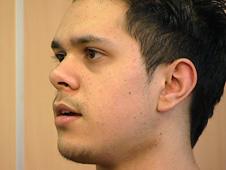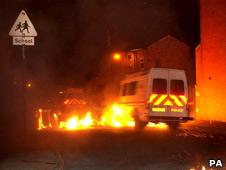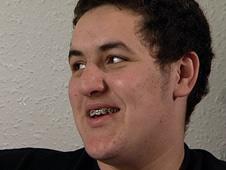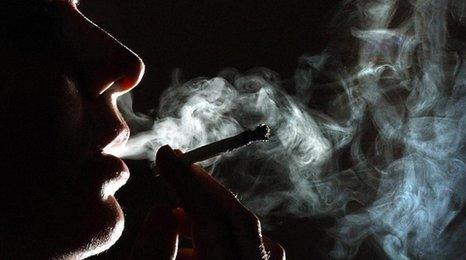Do young people feel British?
- Published

Faz, 16, was born in Oldham but says he feels British not English
It might be written on your passport but do you actually feel British?
That's the question the BBC Switch show Revealed has been asking as part of a special programme to find out how teenagers from across the UK feel about their nationality.
Faz, 16, was born in Oldham but says he's not English. His mum is from England and his dad is from Pakistan.
"I don't live 'English', I don't feel English, I feel British. I'm 100% British.
"I think it's the way I was brought up. It's maybe different to how other people are brought up."
His mate, Kessar, also has parents from both England and Pakistan.
"If someone asks me, I'd say I was British Pakistani, or I'd say I was a Muslim but not English.
Racial tension
Oldham has a history of racial tension and in 2001 there were violent riots in the town.
An independent review said the troubles had been caused by years of segregation between communities.
Both Faz and Kessar say things have improved but that they've both suffered from racist insults.

Hundreds of young people in Oldham clashed with police in May 2001
Kessar said: "I've got an English flag, but I haven't really used it because when England won a cricket match, I had it wrapped around me, walking down the road.
"A car drove past, and someone asked, 'Why have you got that flag? You're not English, you're a Paki'."
Both say the town's history probably has an effect on how they describe themselves to others and why they feel British, but not English.
"I've never met a white person that said they weren't English," said Faz.
Faz and Kessar are friends with Michael, Krissy and Louise. They all say they feel English, but wouldn't necessarily call themselves British.
One reason is that they didn't want to be linked with the images often associated with "Brits abroad".
A survey by the IPPR claims ethnic minorities in the UK are more likely to describe themselves as British than white people.
British split
When it comes to the UK's population the majority live in England. Scotland, Wales, and Northern Ireland have a combined population of around 10 million people.
Some young people in these countries say that being part of a smaller population has an impact on how they feel about being British.
Revealed spoke to a group of teenagers from Falkirk in Scotland.
"If people ask if I'm British and I say, 'Yes', then they just assume I'm English and not Scottish. So I just feel it's better to say, 'I'm Scottish'," one said.
Revealed asked another member of the group how he'd feel if he was called British.
"I'm not. I'm Scottish more than anything else. It's people taking away who you are and generalising it.
"Between 70 million people and five million people, it's much more different. Five million people are much more together," he said.
The town of Machynlleth has a population of around 2,000 people. Hundreds of years ago it was the capital of Wales and lots of young people there say they're extremely proud to be Welsh.
Owen, 16, said: "Since forever the Welsh have been put down by the English and ruled by the English."

Omar says it's weird being Libyan and a practising Muslim living in Devon
His friend David added: "I'm Welsh. It's the way I've been brought up. I've never felt British.
"It's never felt important. I'm just Welsh, that's it. Nobody is British, it's just a word for a cluster of countries."
For other people their nationality is not that clear cut. Omar was born in Exeter, but his parents are from Libya and he says this means he often feels torn between two very different cultures.
"I would say I was Libyan, but I was born in Britain, so I've taken lots of the British culture but when I come home I'm Libyan.
"I speak Arabic to my parents, I'm Muslim and pray five times a day, so it's a bit weird living in Devon."
Asked where he felt his home was, he said: "Probably Libya, but I can't really say Libya because I also think Britain is my home as well. There's a sense of conflict."
Revealed... Do you feel British? is on BBC Switch on BBC Two on Saturday 14 November at 2pm.
- Published2 October 2009
